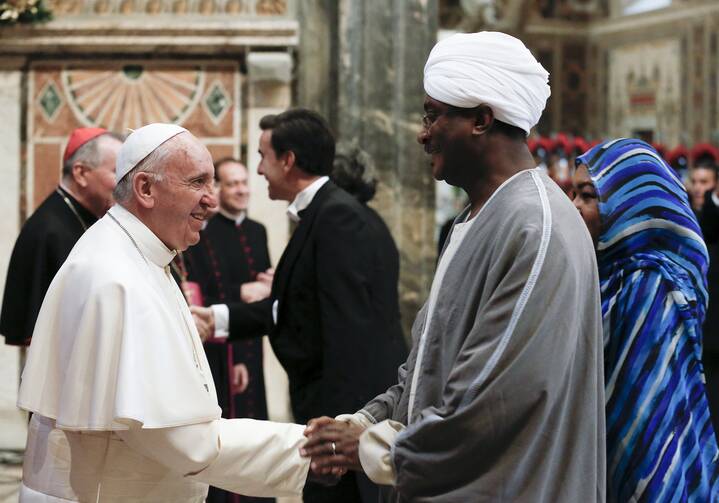Pope Francis has called on European leaders not to turn their back on refugees and migrants despite the cultural and security challenges associated with the arrival of 1 million people this past year.
Francis has made concern for migrants a centerpiece of his papacy, and on Jan. 11 in his annual address to diplomats accredited to the Holy See he again urged governments to “overcome the inevitable fears associated with this massive and formidable phenomenon.”
In the wide-ranging, 45-minute address, the pope said the refugee crisis recalls the epic stories of mass migrations in the Bible with people fleeing powerful forces to seek safety and freedom, often at a terrible cost.
“Now as then, we hear Rachel weeping for her children who are no more,” he said, a reference to passages from both the Book of Jeremiah and the Gospel of Matthew.
“Hers is the plea of thousands of people who weep as they flee horrific wars, persecutions and human rights violations, or political or social instability, which often make it impossible for them to live in their native lands,” Francis told the diplomats.
“It is the outcry of those forced to flee in order to escape unspeakable acts of cruelty towards vulnerable persons, such as children and the disabled, or martyrdom solely on account of their religion.”
More than 1 million people arrived in Europe by sea last year, the vast majority from the world’s top 10 refugee-producing countries. An estimated 3,771 people died or went missing attempting the crossing.
In his speech, which one Vatican observer characterized as the “geopolitics of mercy and realism,” Francis highlighted “the inevitable problems” such an influx creates, as countries struggle to accommodate newcomers to new cultural and social norms.
“Equally significant are fears about security, further exacerbated by the growing threat of international terrorism,” he said, nodding at powerful anti-immigrant sentiments that have inflamed debates in Europe and North America.
Francis noted that next month he would be visiting Mexico and Ciudad Juarez, on the border with Texas, to draw attention to the immigration issue, which has become a focal point of the U.S. presidential campaign.
Such questions have been especially prominent in Germany this month following attacks on women in German cities on New Year’s Eve believed to have been carried out by asylum seekers or migrants.
On Sunday, a group of Pakistanis and a Syrian were attacked in separate incidents in Cologne apparently in retaliation.
While not addressing these incidents specifically, Francis said governments have a “two-fold moral responsibility” to protect both citizens and migrants.
The pontiff said those societies hosting migrants must also acknowledge the “beneficial contribution” a migrant can bring to a community.
Francis praised a number of countries for their acceptance of refugees, particularly Lebanon and Jordan, which have given haven to 1.7 million Syrians. He also highlighted the efforts made by Turkey, Greece and Italy, telling diplomats that nations in the forefront of the current crisis should not be left alone.
The pope directed strong criticism to states for failing to address the multiple causes of migration, which he said led to disasters that could have been prevented.
“Before it is too late, much could be done to end these tragedies and to build peace,” he said. “But that would mean rethinking entrenched habits and practices, beginning with issues involving the arms trade, the provision of raw materials and energy, investment, policies of financing and sustainable development, and even the grave scourge of corruption.”
Describing the dangerous and traumatic experiences suffered by migrants, Francis said governments must act to put a stop to the human smuggling trade: “I once more appeal for an end to trafficking in persons, which turns human beings, especially the weakest and most defenseless, into commodities.
“The image of all those children who died at sea, victims of human callousness and harsh weather, will remain forever imprinted on our minds and hearts.”








